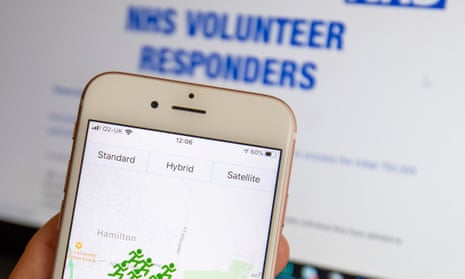When ministers set out to recruit a 250,000-strong army of NHS volunteers and 750,000 signed up, it generated headlines around the world and was heralded by Boris Johnson as proof, contrary to Thatcher’s famous dictum, that there “was such thing as society”.
Nearly a month on, however, and only 75,000 tasks had been logged by the end of last week, rising to 100,000 today - many of them repeat trips for the same household – leaving many volunteers confused or disgruntled that they have yet to be called upon.
NHS Volunteer Responders hoped to attract a quarter of a million helpers to provide app-based community support for vulnerable people self-isolating against coronavirus, but numbers spiralled as the scheme caught the public imagination.
After a frantic vetting process, 150,000 of the 750,000 initial applications were rejected, leaving 600,000 ready to be deployed. Huge numbers are still waiting to be allocated a task after weeks on standby.
Student Sarah Rimmer tweeted on 22 April: “Signed up for the #NHSvolunteer scheme not too long ago. Been ‘Active’ on the app for approx. 2 weeks now. Nothing has happened. I’ve given up.”
She confirmed at the weekend that she was still waiting for a first task. “I’m fed up with the situation, as I was hoping to be of some help during the pandemic but they obviously had more people than they needed sign up and some of us have fallen under the radar.”
The RVS charity, which operates NHS Volunteer Responders, said it it had “a good number of referrals coming in” and expected many more over the coming weeks as recent changes to the scheme, including allowing some charities to refer and enabling vulnerable people to directly contact it for help, took effect.
“Some [volunteers] are naturally disappointed they have not had a call. We are constantly checking in with them to say ‘we are in it for the long run’. Our key priority is to reach all those people who need help and support,” said Rebecca Kennelly, the RVS director of volunteering.
The charity declined to say how many volunteers had yet to be called upon but said demand and supply for helpers could fluctuate over the next few weeks, particularly if people started returning to work. “Have we got too many [volunteers]? This is a crisis. We don’t know what the need will be in coming weeks and months,” said Kennelly.
Although the RVS believes the scheme – effectively built from scratch in five weeks – is working efficiently and safely, and has “phenomenal coverage” of volunteers across every region of England, it is aware that there are some areas where referrals are especially low. It refused to say which ones.
The Royal Pharmaceutical Society said that although it welcomed the scheme “as an option”, its members would already have delivery mechanisms in place for vulnerable patients, and many were nervous about using a scheme for carrying medicines where volunteers were not fully security-checked.
The phenomenal growth of mutual aid groups, which enable vulnerable, isolated people to use neighbours and friends to fetch food and medicines may also have reduced the need for the NHS scheme. There are 4,300 such groups connecting an estimated 3 million people.
Hilary McNevin, 54, an HR manager from south London, was one of the first NHS responders to be allocated a task through the app-based scheme in early April. She said: “Some friends of mine have not had a call at all. Some are getting eight referrals in a week. There are definitely some disappointed people who signed up with all good intentions and have not been utilised.”
McNevin, who said she joined the NHS responder scheme to be able to do something to help – “I was sitting at home feeling a bit purposeless and desperately wanting to do anything I can” – has received and carried out eight tasks which she has enjoyed, though she was expecting to be busier.
She said her experience inspired her to volunteer with a local charity. She believed most NHS volunteers were positive about the scheme: “The attitude tends to be ‘if I haven’t had an alert, it means the people [we are helping] must be all right’.”
NHS Volunteer Responders support GPs, pharmacists and other professionals by carrying out basic tasks such as delivering food and medicines for 1.5 million vulnerable people who have been advised to confine themselves at home to reduce the risk of catching the virus.
Johnson called the response to the launch of the scheme a sign of “incredible public spirit”. There was also a surge in numbers signing up at local volunteer centres, and the emergence of informal neighbourhood mutual aid groups.
Paul Reddish, the chief executive of the charity Volunteering Matters, and the chair of a Whitehall committee on volunteering, said oversupply was inevitable given the sheer numbers of people wanting to help, not just via the NHS scheme.
“Until the need is zero we should not be worried about volunteers being under-utilised. We just need to get to the point where everybody has got food. It’s not that volunteers aren’t wanted or needed. The reality is that the numbers of people has outweighed the need,” he said.
A spokesperson for the NHS said: “The scale of the public response to help means that the Royal Voluntary Service has been able to arrange support for more vulnerable people and their families, with up to 100,000 tasks already completed and a direct line for those who need help now in place, meaning the number of volunteers helping their local communities will expand rapidly. People can call RVS on 0808 196 3646 to get help with their shopping, picking up prescriptions or for a regular chat with a volunteer.”
